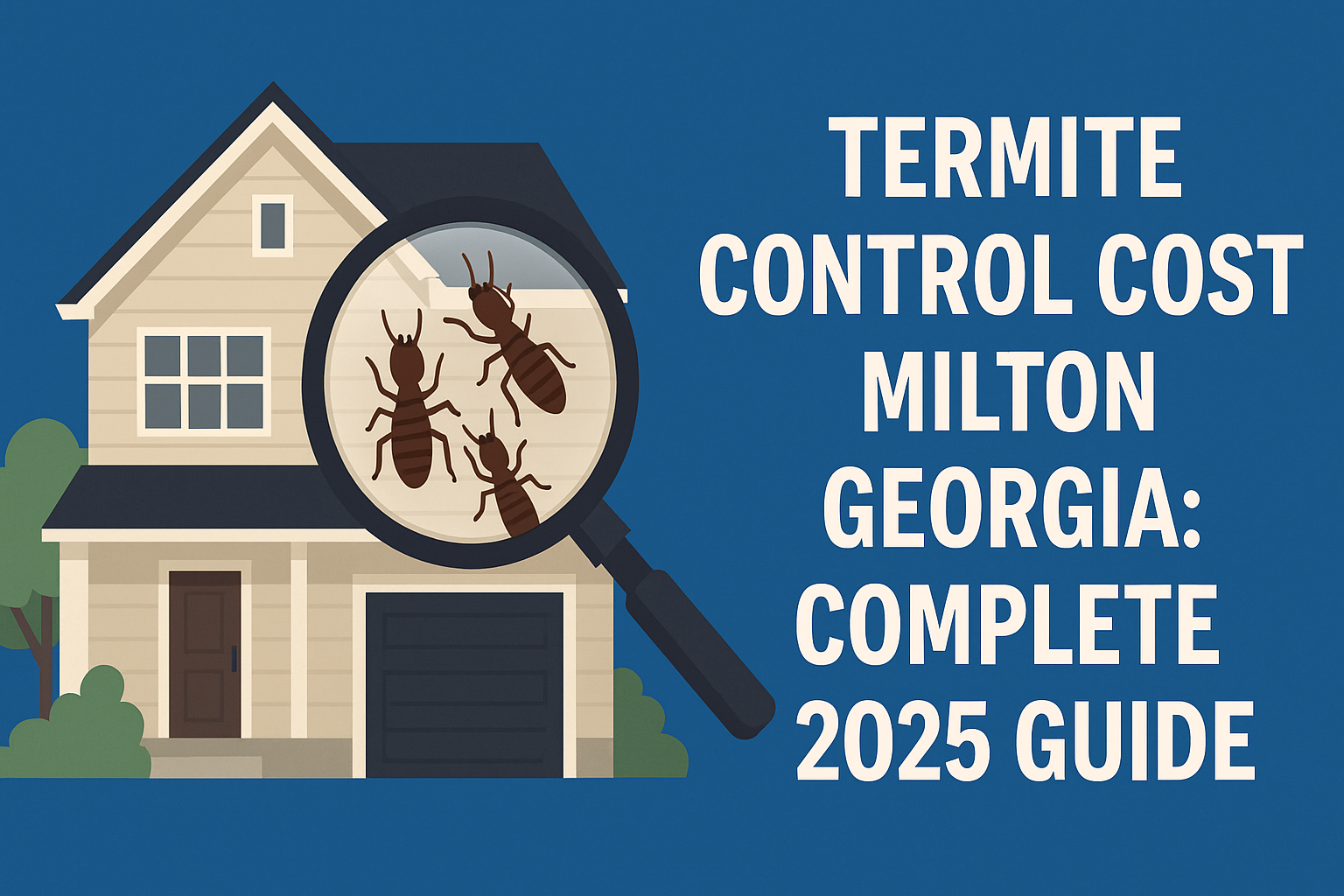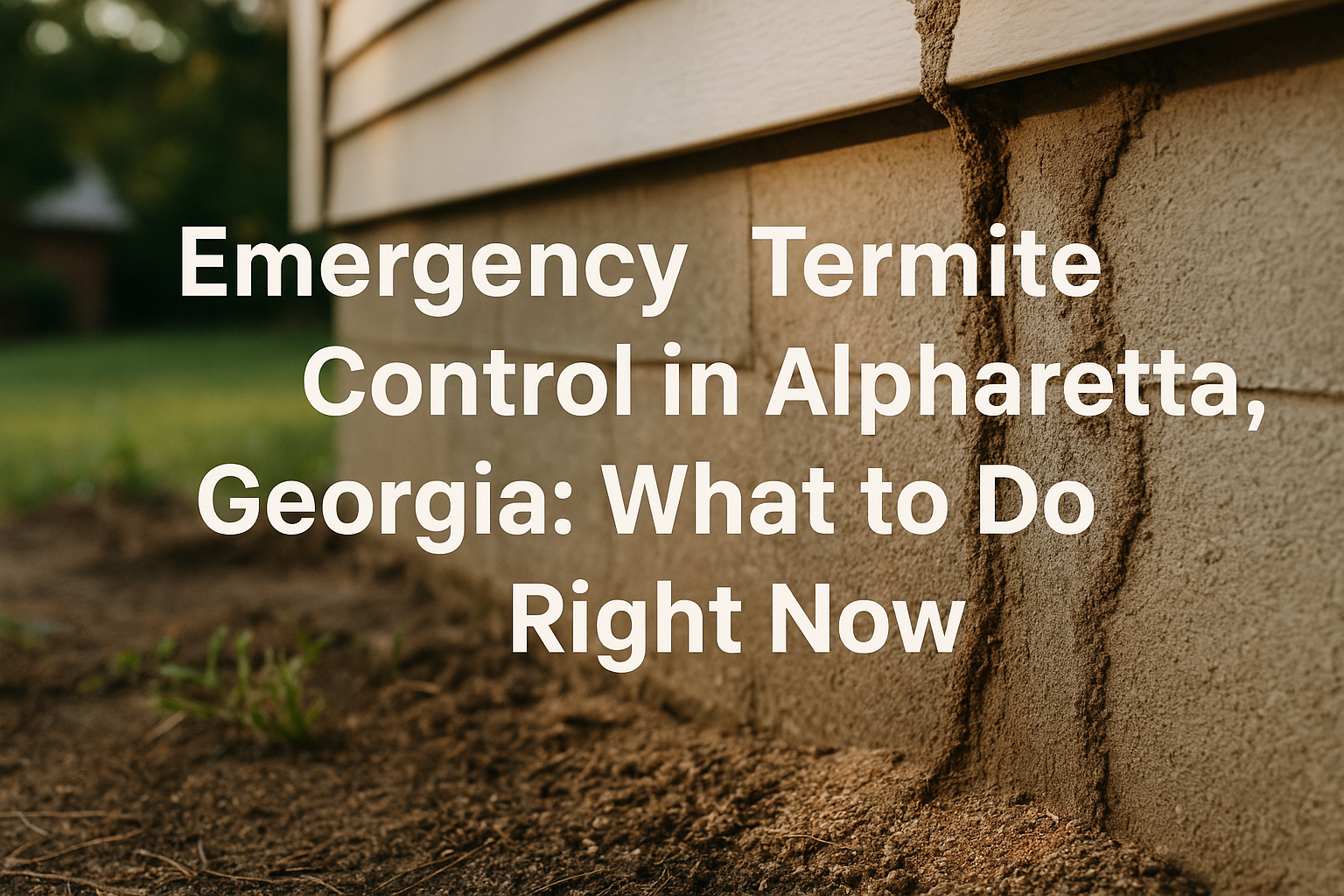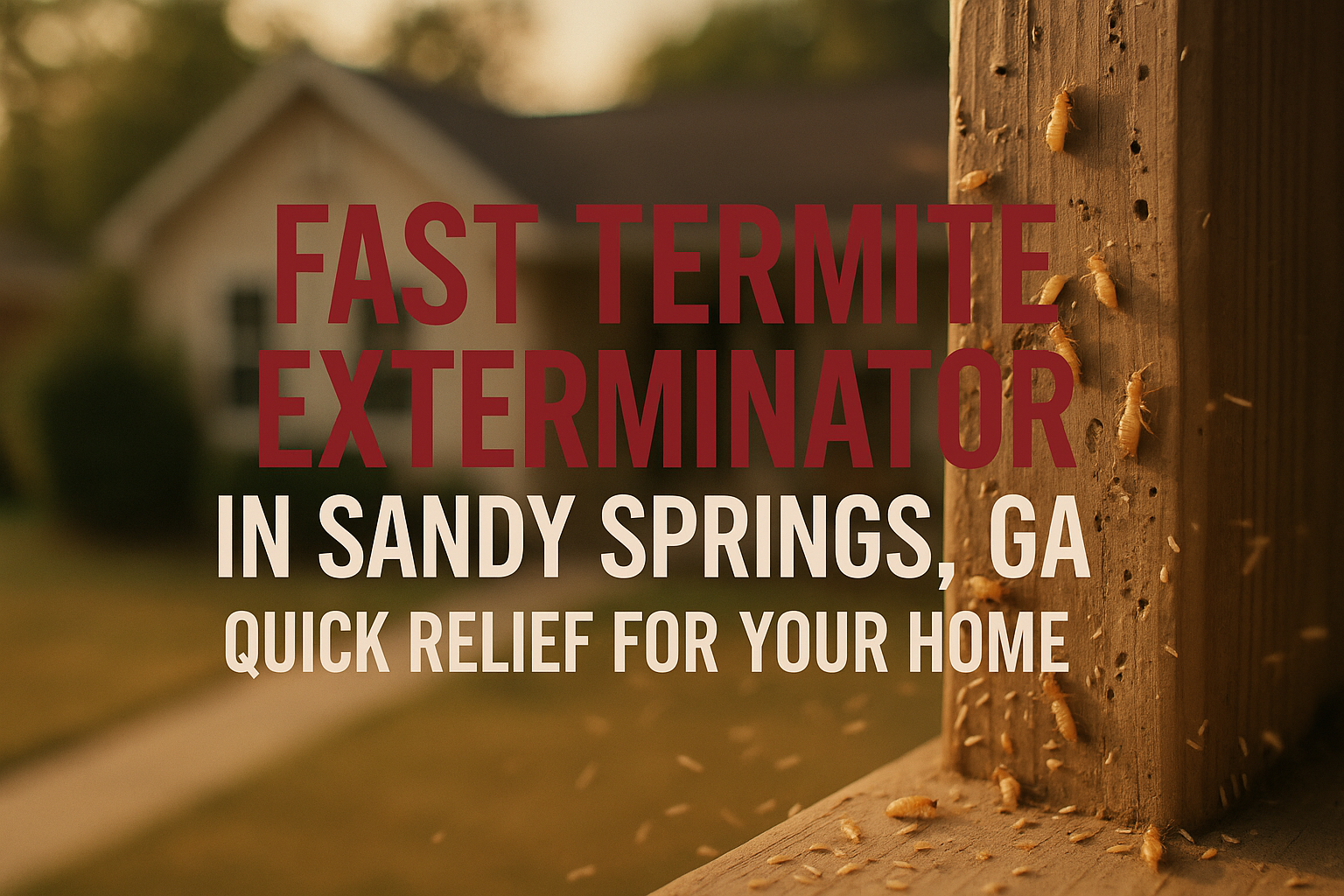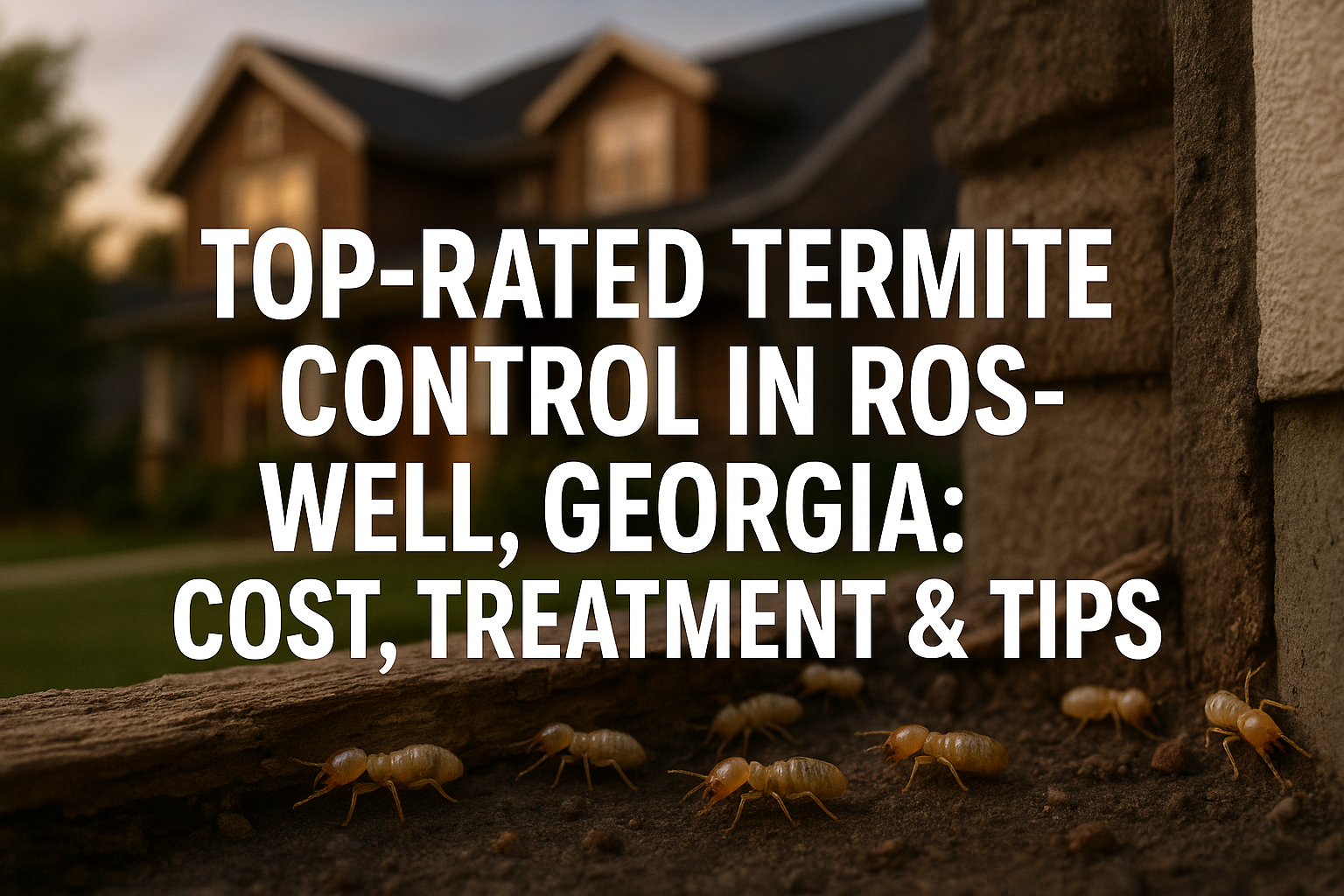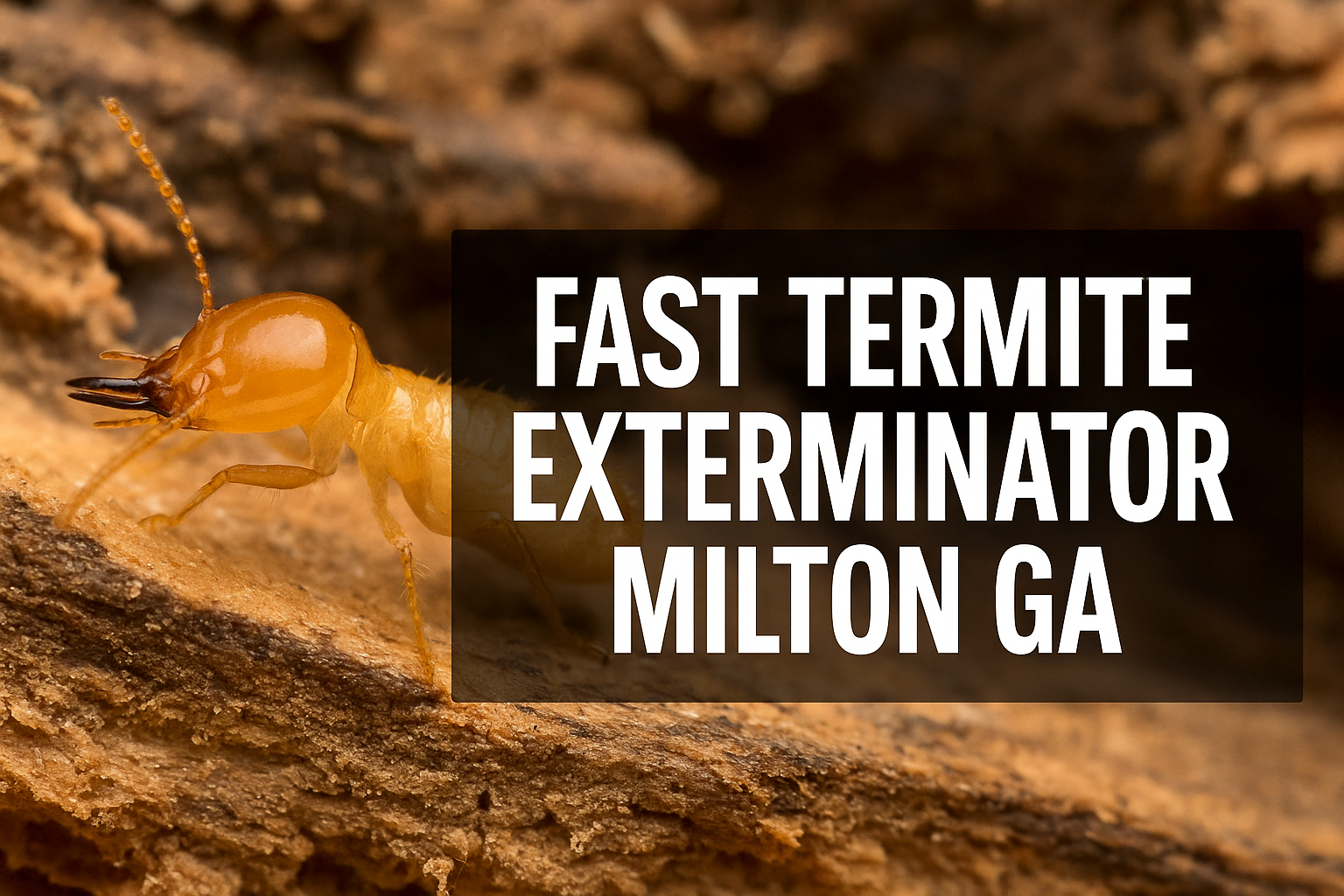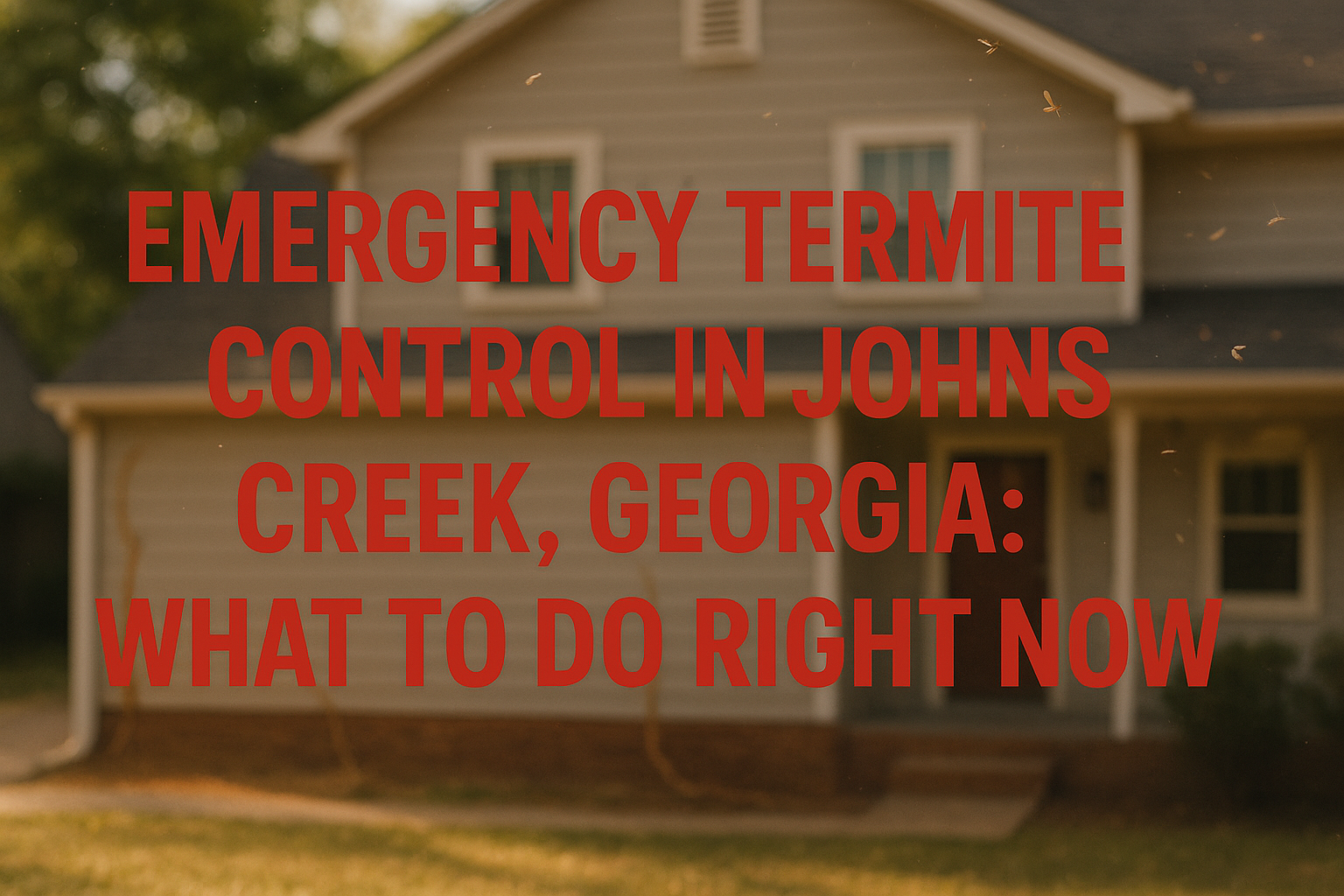Why Termites Are a Big Deal for Milton Homeowners
If you own a house in Milton, Georgia, Termite Control Milton GA is more than just a passing concern—it’s something you really need to stay ahead of. These bugs don’t care how new or fancy your house is; they just love all that Georgia wood. Once termites move in, they can eat right through your framing, support beams, and floorboards, quietly causing damage that’s crazy expensive to fix. We’re talking thousands to tens of thousands of dollars, just from insects you might never actually see.
So, why Milton? Well, our area combines all the things termites love: warm, humid summers; lots of recent construction built with premium wood; and neighborhoods right up against beautiful, wooded land. Pockets like Crooked Creek, White Columns, The Manor Golf & Country Club, and Triple Crown are known for their spacious, upscale homes but unfortunately that luxury wood is a prime target. Belleterre, North Valley, Birmingham Falls—they’re all close to thick forests, which means termites find it easy to move in from the wild.
The financial side of Termite control cost Milton GA isn’t pretty either. Basic termite inspections around here usually cost between $85 and $200. If you discover these critters, treatments like liquid barriers or bait stations generally run from $800 to $2,500 for most homes, but much more for bigger or luxury properties. Ongoing monitoring and maintenance contracts, which are often the best defense in Milton, average $250 to $400 a year.
The bottom line is simple: if you own a home in Milton, termites aren’t just someone else’s problem—they’re a risk in your own backyard. Don’t wait until you see damage or hear about the neighbors shelling out for repairs. Check out the next section for clear, effective options to protect your biggest investment before termites even get a chance to move in.
What Actually Impacts the Cost of Termite Control Milton GA?
If you’re dealing with termites in Milton, understanding what affects the cost of Termite Control Milton GA is key. The price tag isn’t just random—it depends on a few critical factors specific to your property and the kind of work that needs to be done.
- Size & Layout of Your Property
Honestly, if you’ve got a bigger home, especially a custom build out in White Columns or The Manor, expect the cost to go up. More square footage and tricky features like finished basements, crawl spaces, or tiered landscaping means there’s more ground to cover. Fencing, sheds, and outdoor kitchens—these add complexity and cost too. - Extent of the Infestation
If termites are just starting out in a small spot, you might get by with a simple treatment. But if they’ve done a number on the place, or if they’ve spread into hard-to-reach spaces, the price definitely ticks up. Severe damage may even mean repeat visits or extensive monitoring until things are 100% cleared up. - Treatment Type You Choose
There’s no one-size-fits-all fix. Each treatment method comes with its own price range:- Spot Treatments: Good for minor, localized problems. Generally $200–$750. Best for early detection.
- Barrier Treatments (liquid or chemical perimeter): These wrap your home in a line of defense, usually $1,200–$2,500 for average-sized homes, but can be higher for estates with extensive landscaping.
- Bait Stations: Often used for ongoing monitoring or eco-friendly approaches. Installing and servicing a full system might run $1,500–$3,500, depending on yard size and the number of stations needed.
- Fumigation: Usually a last resort for severe, widespread infestations, and pricing starts at around $3,000 and can easily exceed $7,000+ for larger or luxury properties.
- Your Neighborhood & Risk Profile
Some pockets of Milton, like Crooked Creek or Atlanta National, are at higher risk due to nearby woods or older construction. If you’re in an area with a history of termite issues, professionals might recommend more intensive monitoring, which adds to the quote. - Inspection, Monitoring & Service Plans
Initial inspections normally cost $75–$175, but some companies roll this fee into the treatment cost if you move forward. Monitoring and maintenance—think quarterly or annual plans—are smart for long-term peace of mind. Plans typically range from $250–$800 per year, with lower rates for simple annual checks and higher for full quarterly service with a contract.
The short version: your neighbor down the road might pay a very different price than you, depending on what’s going on beneath the surface. The best move? Have a local pest pro come out, walk the property, and give you a custom quote. That way, you’re not guessing—and you won’t get surprised by hidden costs.
What Actually Impacts the Cost of Termite Control Milton GA?
If you’re dealing with termites in Milton, you probably want to know what’s really driving the cost of termite control Milton GA services. The price tag isn’t just random—it depends on a few key things specific to your property and the kind of work that needs to be done.
- Size & Layout of Your Property
Honestly, if you’ve got a bigger home, especially a custom build out in White Columns or The Manor, expect the cost to go up. More square footage and tricky features like finished basements, crawl spaces, or tiered landscaping means there’s more ground to cover. Fencing, sheds, and outdoor kitchens—these add complexity and cost too. - Extent of the Infestation
If termites are just starting out in a small spot, you might get by with a simple treatment. But if they’ve done a number on the place, or if they’ve spread into hard-to-reach spaces, the price definitely ticks up. Severe damage may even mean repeat visits or extensive monitoring until things are 100% cleared up. - Treatment Type You Choose
There’s no one-size-fits-all fix. Each treatment method comes with its own price range:- Spot Treatments: Good for minor, localized problems. Generally $200–$750. Best for early detection.
- Barrier Treatments (liquid or chemical perimeter): These wrap your home in a line of defense, usually $1,200–$2,500 for average-sized homes, but can be higher for estates with extensive landscaping.
- Bait Stations: Often used for ongoing monitoring or eco-friendly approaches. Installing and servicing a full system might run $1,500–$3,500, depending on yard size and the number of stations needed.
- Fumigation: Usually a last resort for severe, widespread infestations, and pricing starts at around $3,000 and can easily exceed $7,000+ for larger or luxury properties.
- Your Neighborhood & Risk Profile
Some pockets of Milton, like Crooked Creek or Atlanta National, are at higher risk due to nearby woods or older construction. If you’re in an area with a history of termite issues, professionals might recommend more intensive monitoring, which adds to the quote. - Inspection, Monitoring & Service Plans
Initial inspections normally cost $75–$175, but some companies roll this fee into the treatment cost if you move forward. Monitoring and maintenance—think quarterly or annual plans—are smart for long-term peace of mind. Plans typically range from $250–$800 per year, with lower rates for simple annual checks and higher for full quarterly service with a contract.
The short version: your neighbor down the road might pay a very different price than you, depending on what’s going on beneath the surface. The best move? Have a local pest pro come out, walk the property, and give you a custom quote. That way, you’re not guessing—and you won’t get surprised by hidden costs.
Why Milton Homes Attract Termites—and What That Means for You
If you live in Milton, you probably already know we get our fair share of rain and muggy weather, especially in the spring and summer months. All that humidity and rainfall is heaven for termites—they love moisture, and our climate keeps the ground and wood nice and damp, giving these pests exactly what they want to thrive. Once the weather warms up, termite activity really gets going around here.
Milton’s soil is another big factor. We’ve got plenty of soft, moisture-rich earth, which makes tunneling easy for termites, especially the subterranean kind. They use the soil as a superhighway straight into homes. Older homes in our area are especially at risk because of their wood framing and those classic crawl spaces and basements—plenty of hidden entry points and often a little rot or dampness termites just can’t resist.
Even in newer neighborhoods, homes with heavy wood accents, decks, and lush landscaping (think dense shrubs or mulch close to foundations) are more at risk. That beautiful green yard might draw curb appeal, but it can also draw termites if moisture stays trapped next to the house. Properties with tall trees, shaded yards, or places where leaves and mulch pile up are prime spots for termite problems to keep coming back.
Every part of Milton is a bit different when it comes to termite risk. For example, neighborhoods near the river or flood-prone areas tend to need more aggressive control and sometimes more frequent inspections. Tight property lines or homes built close together often mean custom treatment plans—your neighbor’s problem can easily become yours.
All these local conditions—weather, soil, the age and layout of your home, and your landscaping—really shape how termite control is done and what it costs. Complex or older structures, or those with lots of landscaping, often require longer, more detailed treatments (and yes, sometimes a higher price). If you want a better sense of how these factors come into play, check out the visual guide coming up next; it’ll break down Milton’s unique termite scene at a glance.
Simple Ways to Keep Termites Off Your Milton Property
If you’re a homeowner in Milton, you know that termites can cause real headaches (and hit the wallet hard). The good news? You can do a lot right now to make your house less tempting to these pests. Here’s how to get ahead of the game and save yourself money down the road.
- Moisture is Termite Fuel: Termites love damp wood. Take a walk around your house—are your gutters clogged? Do downspouts drain way too close to your foundation? Fix leaks under sinks, repair any gutter or downspout drama, and make sure your crawl spaces are dry and well-ventilated. Milton’s rainy spells can really do a number, so check after storms too.
- Get Eyes on Your Foundation: Block out a Sunday afternoon for a termite check. Look for mud tubes, hollow-sounding wood, or cracked paint along your home’s base. Spot anything sketchy? Act fast before things get worse.
- Clear Out Wood Debris: Got firewood stacked up against the house? Old lumber beside the garage? That’s asking for trouble. Store firewood at least 20 feet away and keep mulch or wood chips to a minimum, especially near your foundation. If you’ve got leftover construction wood, haul it off.
- Smart Landscaping: Trim back shrubs, bushes, or tree branches so they don’t touch your roof or siding. Leave a little breathing room—aim for six to 12 inches, if you can—between your house and your mulch beds. This helps keep moisture and pests at bay.
- Seal Up Gaps: Walk your foundation and doors. Seal cracks and gaps with caulk, and replace weather stripping where needed. Termites don’t need much of an opening to sneak in.
- Schedule a Pro Check: Even if you’re the DIY type, it pays to have local termite pros check your place once a year. They know what’s normal in Milton, what’s not, and can spot subtle signs early—saving you big bucks later.
These simple steps can make all the difference. By staying one step ahead, you’ll keep termites at bay and protect your investment. Ready to get started? Up next, we’ve got a super-handy prevention checklist you can use to double-check your home and yard!
Why Timing Matters for Termite Treatment in Milton, GA
If you’ve lived in Milton for a few seasons, you know how wild the bugs can get once the weather warms up. Termites are no different. As soon as spring hits and we start getting those humid, rainy days, termite colonies get busy—and that’s when your home is most at risk. Early spring through the end of summer is their favorite time to swarm, looking for new places (like your house) to build a cozy nest. This is absolutely the high season for termites around here.
There’s another reason timing is everything: When termites are active near the surface, treatments like liquid barriers or bait stations work better and faster. Catching an infestation early in the season means you can nip the problem in the bud, often with less hassle and cost. Wait too long, and the infestation gets tougher (and pricier) to handle.
Here’s an insider tip: Once spring starts, every local pest company’s phone rings off the hook. More demand can mean longer waits and, in some cases, higher prices. But if you reach out right at the start of spring—or even late winter—you can usually score better rates, easier scheduling, and early season promotions. Plus, smart homeowners in Milton often lock in year-round protection plans or maintenance contracts during this time, which can save cash and stress over the long haul.
- Spring and early summer: Most effective time for treatment, biggest surge in termite activity.
- Late summer and fall: Termite activity slows, but inspections are still important, especially if you missed spring.
- Winter: Termites are less visible but don’t go away—plan ahead for next season or schedule prevention work when demand is low.
Bottom line: Don’t wait until neighbors start telling stories about termite damage. Locals who schedule termite control Milton GA services in early spring get the jump on the bugs and the best value. If you want to see how the seasons stack up, be sure to check out our handy seasonal comparison infographic below—it’s got everything you need to time your termite defense just right.
Take the Worry Out of Termites – Let’s Get Started
Don’t let termites catch you off-guard. The earlier you spot them, the easier and more affordable they are to handle—seriously! Our local Milton experts at Anthem Pest know these neighborhoods inside and out, and we’re here to keep your home safe with a free, no-pressure inspection. Get honest answers and transparent pricing tailored to your property. Ready to take control? Call us today at 877-3718-5196 or visit us online. Want even more Milton-specific tips? Check out our local termite resource guide and see why your neighbors trust Anthem Pest.
Common Termite Control Questions from Milton Homeowners
- How can I tell if I have termites?
You might spot mud tubes along your foundation, tiny piles of what looks like sawdust (that’s termite droppings), or even hear hollow-sounding wood. Sometimes, you’ll catch flying “swarmers” inside in spring. If anything looks suspicious, it’s smart to call a local pro to check things out—termite damage can get out of hand fast. - How often should I get my home inspected?
In Milton, most experts recommend a professional termite check every year. Our climate is pretty inviting for termites, and routine inspections help catch problems before they become expensive headaches. - What’s the deal with bait versus barrier treatments?
Barrier treatments create a protective shield in the soil that termites can’t cross—think of it as a moat around your home. Bait systems, on the other hand, lure termites into stations with tasty treats that slowly wipe out the colony. Both work, but your home’s layout and your pest pro’s advice will help decide what’s best for you. - Is an annual termite plan worth it?
Definitely. The price of prevention is nothing compared to the cost of repairs. An annual plan gives you regular inspections, treatments as needed, and peace of mind. Especially around Milton, where activity can pop up when you least expect it. - How long does termite treatment take?
For most homes, the initial treatment can be done in a day, though it depends on the method and how big your place is. After that, you might need follow-ups to make sure termites aren’t coming back. - Will my homeowners insurance cover termite damage?
Unfortunately, no. Most policies don’t cover termite damage because it’s considered preventable. That’s why it’s so important to stay ahead with inspections and treatment if needed. - Do luxury homes or bigger homes cost more to treat?
Usually, yes—the bigger the property, the more time, product, and expertise needed. But every home is different, so a quick on-site inspection will give you the most accurate price. - Are certain Milton neighborhoods at higher risk?
Some areas with older homes, dense trees, or lots of moisture can see more termite activity. Local pros know the hot spots and can help you figure out your risk and the best steps to keep your home protected.
If you’ve got more questions or want a local termite expert to take a look, don’t wait—early action is always your best bet in Milton.

